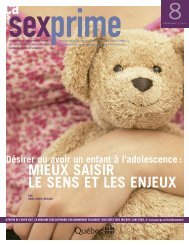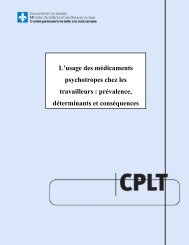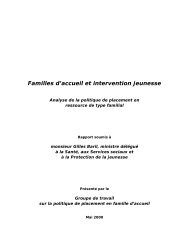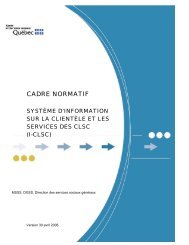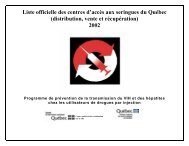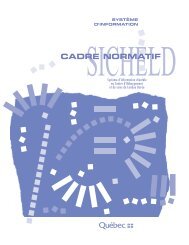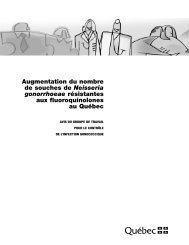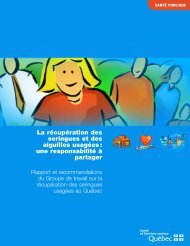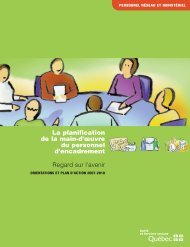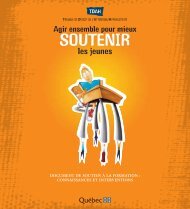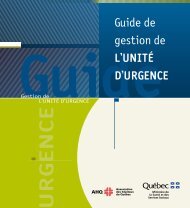De l'innovation au changement - Gouvernement du Québec
De l'innovation au changement - Gouvernement du Québec
De l'innovation au changement - Gouvernement du Québec
Create successful ePaper yourself
Turn your PDF publications into a flip-book with our unique Google optimized e-Paper software.
4. PROCESSUS DE MISE EN ŒUVRE<br />
Projet 16<br />
Impact of a discharge coordinator on the sucessful discharge<br />
of elderly patients from the emergency department (ED),région de Montréal<br />
Impact d’un coordonnateur des congés <strong>au</strong> département d’urgence (DU)<br />
sur le succès <strong>du</strong> congé des patients âgés<br />
emergency department, hospital and community health services 3) improving the communication between the emergency and community<br />
health care providers.<br />
Research question : What is the impact a dedicated discharge planner in the ED on elderly patients discharged from the ED in terms of:<br />
ED return visits and hospitalisations within 14 days of discharge, satisfaction with discharge, compliance with discharge instructions, and<br />
perception of well being<br />
4.1 Modalités de mise en oeuvre The nursing intervention, delivered by a discharge nurse dedicated to the elderly, was structured, in this project, to include patient<br />
e<strong>du</strong>cation, coordination of referrals and appointments, telephone follow up and telephone access to the nurse discharge coordinator within<br />
7 days of discharge. Although formalised, the intervention was indivi<strong>du</strong>alised to the needs of each patient and family. In order to be<br />
effective, three nurses were hired to be able to cover evenings and weekends, periods that were traditionally vulnerable to “patients falling<br />
through the cracks”.<br />
A large emphasis was placed on medication management – assistance to acquire medications, and the understanding of administration of<br />
new medications.<br />
Emphasis was placed on assistance with acute pain management – mostly in the use of narcotic and non-narcotic analgesia. Other<br />
symptom management teaching often related to the degree to which the patient seemed interested.<br />
Practical strategies for creating a learning environment most often included the inclusion of family members.<br />
4.2 Enjeux ou défis posés par<br />
l’innovation<br />
Aucune information à ce sujet.<br />
4.3 Conditions favorables ou facilitantes Factors that affected learning were most often related to the length of time patients waited to be seen and have diagnostic test results. This<br />
was found to impede learning. Patient fatigue impeded their ability to absorb information. Reinforcement of information was often<br />
con<strong>du</strong>cted over the telephone. Involvement of family members in the learning process also strengthened the retention of new information.<br />
Emergency physicians identified and expressed a broader ‘comfort level’ in discharging higher risk patients with the knowledge that they<br />
would be followed by the nurse discharge coordinator. As a consequence, medically unnecessary overnight stays in the ED were at times<br />
avoided.<br />
A priority telephone line between the hospital and the CLSC’s, created as a direct result of the study, facilitated the response time to the<br />
CLSC intake service. Future goals include development of a system to quickly identify patients in the ED who are regular uses of<br />
community home care services “guichet unique”, and as such, considered the most frail.<br />
4.4 Obstacles It is clear that the intervention group was more frail and therefore perhaps at higher overall risk of return. These differences in the group<br />
health characteristics can be explained as follows. In the control phase, patients were asked to consent to an interview in the ED and over<br />
the telephone. They were not provided with any care or compensation. Therefore, those patients who were more functionally frail or<br />
perceived their illness as being very severe, tended to refuse participation stating that they were too sick to participate.<br />
82



